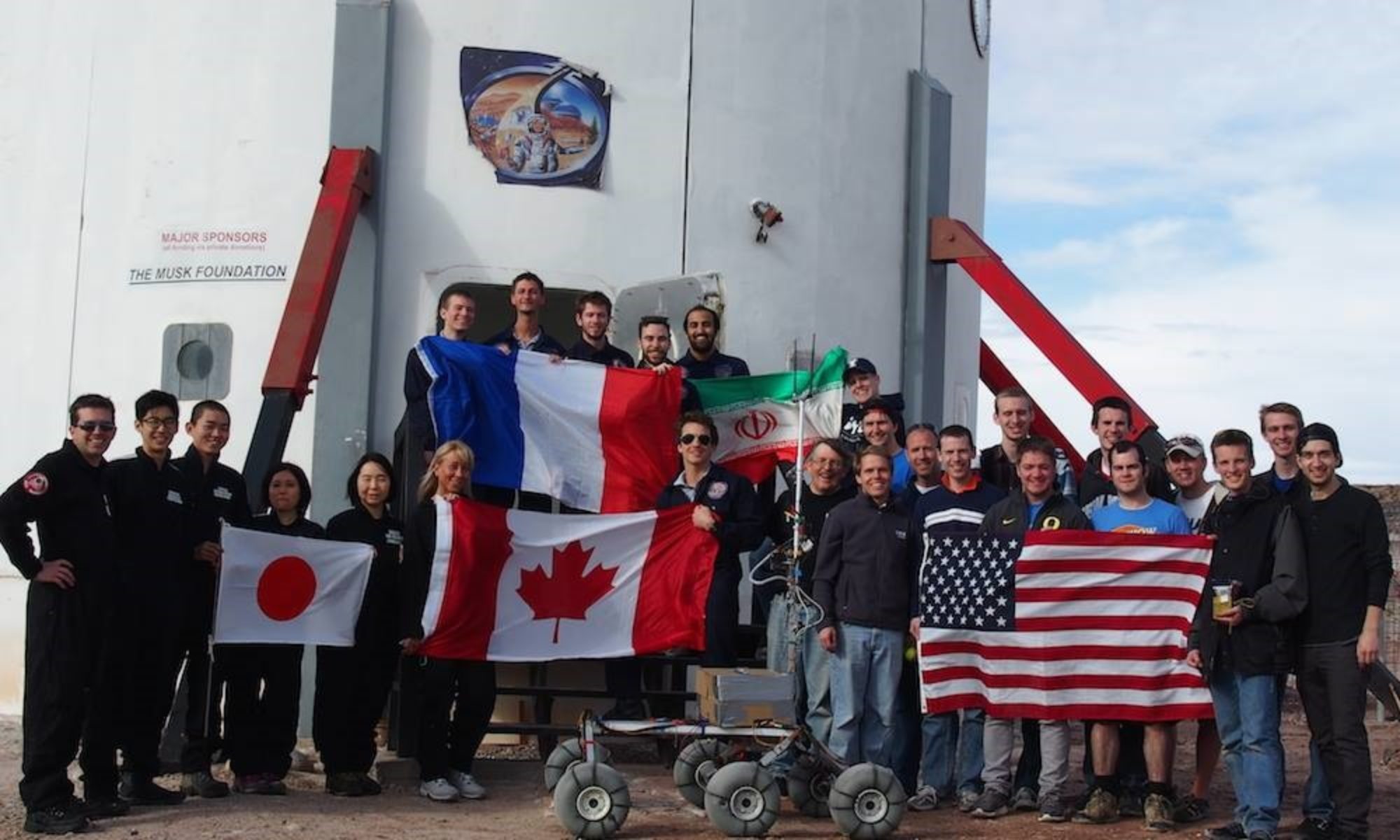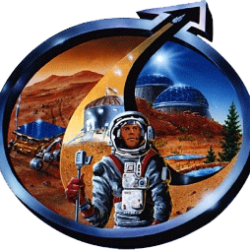Sol 16: Interview with: Journalist – How to share our experience with people on Earth?
Author: Pierre Fabre
Hi everyone, welcome! Today we are going to do the “Interview with: Journalist”. My crewmates have prepared questions for me and I can’t wait to answer them!
But before, as always, let’s talk about what happened during this Sol 16 on Mars.
We are going to do that quickly today because there is not a lot of time left before the end of the communication window – time has caught up to me as I wrote the interview! Moreover, this was a fairly quiet day.
This morning, Maxime, François, and Clément went to explore the South of the station for once. They went to the region called Kissing Camels. According to them, the south is really beautiful in its Martian style. They climbed a ridge and they found a beautiful view. There was a lot of wind today and they were a bit scared that the winds could get high enough to knock over scientific equipment, but the weather stayed true to the forecast in the weather report yesterday, so they had nothing to fear. They also found some petrified wood. I personally don’t know much about that subject but it is really beautiful to see.
This afternoon, Marion, our crew scientist, made a lot of videos about our experiments. Now I can tell you that videos of “Interview with” and “Focus on” will be released on our YouTube channel when we will be back on Earth. I think it will be very interesting. Marion will work on the “Focus on” part and I will do the “Interview with” part, we can’t wait to edit and show you those videos.
Now it is time for the “Interview with”! Clément, as he was the crew’s Journalist two years ago, will start this interview. I hope you will enjoy it!
“Clément: Hi Pierre! How are you today?
Pierre: Fine thank you! It feels a bit weird to be on the other side and become the one who has to answer the questions!
Clément: Ok so first, can you introduce yourself to those who don’t know you yet?
Pierre: I see that you’ve learned the format of the “Interview with”! Ok so, my name is Pierre Fabre and I’m the Crews 240’s journalist! I’m an engineering student at ISAE-SUPAERO. I have done an Erasmus at Escuela Politécnica de Madrid in Data Science and Machine Learning. During my gap year, I’ve done an internship as a research assistant at LAAS-CNRS, a French lab, in control theory on the subject of event-based command for nonlinear systems.
When we come back on Earth, I will do another internship at Safran, in Paris, in Model Predictive Control. For my last year at ISAE-SUPAERO, I want to specialise in control theory and autonomous systems. In my future work, I would like to associate control theory with reinforcement learning for applications that make sense for me, that help people in their daily lives. Apart from that, I love climbing, especially bouldering. I can’t wait for next semester to go to Fontainebleau in Paris which is kind of a paradise on Earth for bouldering.
Clément: Pierre, as you said in your introduction, you are the journalist of this crew, can you explain what is your job.
Pierre: Ok so, basically the journalist has to send a daily journalist’s report to the MDRS’s staff. This implies going to talk to every crew member to ask them how they feel, what they did during the day, how their experiments are doing. These are the basics. In addition to that, I also have to translate my reports into French every day and send them to Earth. Then, our colleagues on Earth post the reports in both languages on our website and they do posts on social media with the pictures.
Julie: Hi Pierre! I wanted to ask you: Why did you choose to apply for the role of Journalist?
Pierre: Hi Julie! That is a good question! I think that Journalist is an important role. It is important for people on Earth because thanks to the reports, they can follow our mission and share this unique experience with us. It is important for the families who want to have news from us and know how the mission goes. But it is also important for us because it allows us to describe how we feel and what we are doing here which is something we can only do through the reports! I felt attracted by this responsibility and in the meantime, I think I kind of like to write and tell stories!
Maxime: Hi Pierre! I wanted to know: What is your favourite part of the job?
Pierre: Hi Maxime! Hmmm, that is a hard one! I think what I like the most is doing the “Interview with” and the “Focus on” formats. I love “Interview with” because it is a really nice opportunity to talk with every crew member one by one. This can seem a little weird but it is true, there are not tons of occasions like that where you are only two in the same room. The interview itself is really cool and I love to share them with you because it allows you to know us better, but the conversations we have off-camera are even better because we can talk honestly about the issues we deal with, how we feel, and sometimes it allows me to help make things better if I can.
I also love the “Focus on” format for the reasons we talked about in yesterday’s report. I think this mission is a really nice opportunity to talk about Mars, Space, and Science in general to a wide audience and I love the idea that some people might learn things reading my reports.
Marion: Hi Pierre! And what is the most difficult part of the job?
Pierre: Hi Marion! Another hard one! I have once again two answers in mind! The first one is the fact that my days are kind of shifted compared to the other crew members. Let me explain. It is hard to talk about what happened during the day before the day is over. I have to wait until the end of the afternoon before thinking about the construction of the first part of the report (the second part, “Interview with” and “Focus on” episodes are made sooner in the day so they are not really a problem).
So, this means that most of the time my work for the first part of the report and the translation starts when my crewmates end their day and start chilling. This can be very frustrating because they seem to enjoy those moments of resting, discussing, laughing and I can’t share those with them.
Another difficult part is the lack of feedback. The only feedbacks are the ones from my crewmates when they want/have the time to read my reports, the ones from the MDRS staff, and the ones from our colleagues on Earth. There are, I hope, more people that read those reports and it is sometimes frustrating not to have their feedback.
François: Hi Pierre! I was wondering where does your inspiration come from?
Pierre: Hi François! Good question! Before the mission, I was really worried about the lack of inspiration, the white page syndrome. Three weeks is a lot and I wasn’t sure I would be able to find interesting topics every day. Moreover, as the days are passing there are fewer things that happen during the day, as we have noticed already, and as a consequence, fewer things to put in my reports. That’s why I created a plan before the mission. Every “Interview with” or “Focus on” episode was scheduled, I knew when I would do reports about Martian Food or Martian House.
This is a relief for me because even if I have nothing to say about the day, I still have something interesting to put in my reports! With that source of stress removed, the inspiration comes quite naturally. To be honest, I don’t think my style of writing requires a lot of inspiration, I just try to talk about what happened during the day in a way that everyone can understand and still enjoy.
Clément: Pierre, you’ve spent the last three weeks or so is our only contact to the Earth, but we didn’t have a lot of access to information from out there. How does it feel to know that in a few days, you’ll be able to see the reaction everyone on the outside has had to your work?
Pierre: Wow! I hadn’t thought about that before you asked, but I guess you know what you are talking about as a former Journalist. Let me think. I am pretty excited to see the reactions to my reports, as I said to Marion, the lack of feedback is sometimes hard to deal with, but I’m also quite nervous about it. I really don’t know what to expect, I don’t even know how many people are reading those reports.
I think it will definitely feel good if I receive positive comments on the work I’ve been putting in those reports but it will feel terribly frustrating if I read constructive comments on how to make my report better because it will be too late to do something about it. The worst scenario would be to discover that no one cares but let’s not think about it! Sorry for that messy answer but this is all I have! “
That’s it for today’s “Interview with”! It was really cool to be on the other side of the interview and my crewmates asked me some really interesting questions! I have good news for you, this was not the last episode of this format. When we will be back on Earth, I will do the last episode with Raphael, our botanist who couldn’t take off with us to Mars! I can’t wait to do this interview; it is important for me to do it!

